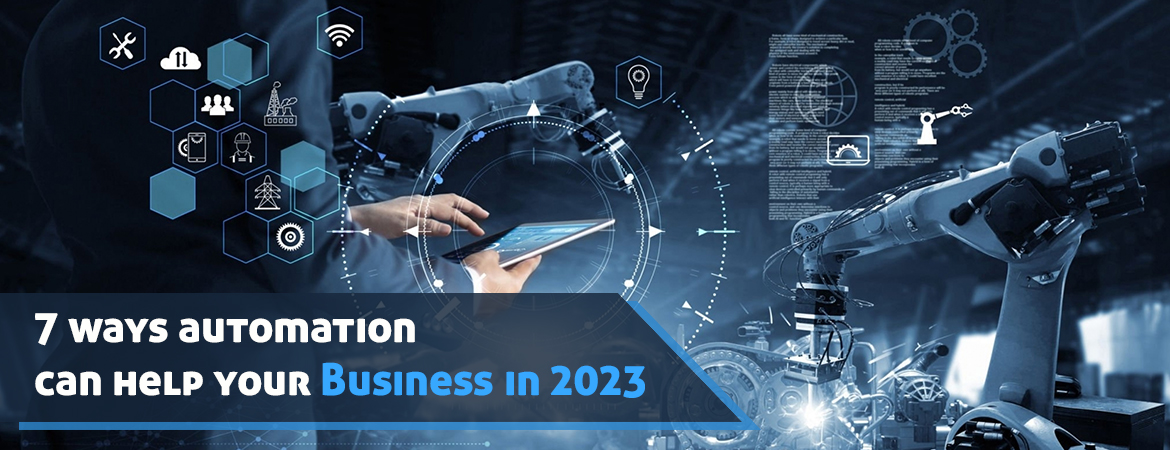
We use cookies to ensure that we give you the best experience on our website.
By using this site, you agree to our use of cookies. Find out more.
This blog discusses 7 key ways automation can help accelerate your business goals in the new year. By leveraging automation to streamline workflows, analyze data, scale operations, and much more, you set your organization up for sustainable growth in 2023 and beyond.

The rise of automation technologies is transforming businesses at an unprecedented pace. AI, machine learning, robotic process automation, and other tools are poised to radically alter how companies operate in 2023 and beyond. For businesses of all sizes, embracing appropriate levels of automation offers a wealth of benefits - from reducing costs and improving efficiency to enhancing customer experiences and fueling innovation.
However, implementing the right automation strategies can be challenging. By leveraging automation to streamline workflows, analyze data, scale operations, and much more, you set your organization up for sustainable growth in 2023 and beyond.
Business Process Automation involves the use of software, robotics, machine learning, and artificial intelligence to partially or fully automate business processes and workflows. It allows businesses to complete tasks such as data entry, transaction processing, document management, and routine communications with greater speed, accuracy, and consistency while reducing costs. Rather than relying on human labor, business process automation utilizes software robots and AI systems to follow predefined rules and execute tasks autonomously.
This enables businesses to operate 24/7, as automated processes can continue running even when employees are unavailable. Automating repetitive or mundane tasks frees up employees to focus on more strategic work that advances business goals. When implemented effectively across departments and functions, business process automation can optimize operations, improve efficiency and transform how an organization serves customers.

Here are 7 ways automation can help your business:
Automation can dramatically improve business workflows by handling repetitive manual tasks faster, more accurately, and consistently. Automated processes follow set routines and rules that don't vary based on the individual executing the task. This consistent execution streamlines workflows and standardizes how tasks are completed. Automation also connects different processes and departments within an organization, integrating data and handing off work seamlessly. The result is a more efficient transfer of information and materials through the various stages of a workflow.
When automation is integrated enterprise-wide, it can eliminate manual handoffs, redundant data entry, and other sources of delays that plague workflows. Overall, streamlining workflows through automation can accelerate processes, reduce errors and waste, and improve how value moves through your business.
Read Also:- How Does Business Process Automation Deliver 400 % ROI?
Automation can significantly improve the customer experience by making engagements faster, simpler, and more consistent. Automated systems can handle routine customer requests and common inquiries 24/7, freeing employees to focus on more complex issues that require a human touch. Customers benefit from self-service options that allow them to get information or carry out tasks at their convenience.
Interactive voice response systems, chatbots, and virtual assistants powered by AI and machine learning can respond to customers immediately and intelligently, improving engagement speeds. Automated tasks like order fulfillment, invoice generation, and password resets are done accurately and swiftly, enhancing service levels. Consistently applying automation across all customer touchpoints - from emails and social media to call centers and retail locations - results in a more seamless, uniform experience for customers.
When done strategically, automation helps businesses build more human experiences by reducing frustrations and enabling employees to spend more valuable time interacting directly with customers. Overall, thoughtful automation holds great potential for meaningfully enhancing customer satisfaction and loyalty.
Automation testing tools play an essential role in establishing a high-quality assurance process for software products and digital services. They enable teams to test applications, websites, and APIs quickly, consistently, and at scale. This ensures issues are found and fixed before reaching customers. Some of the most popular automation testing tools for quality assurance include:
Automation testing tools allow teams to execute thousands of test cases continuously to identify bugs earlier in the development process. They speed up testing cycles, improve test coverage, and raise the bar for quality. Automated tests can be integrated into CI/CD pipelines and rerun each time code is checked in. The results help develop confidence that new features and code changes do not introduce defects.
Overall, automation testing tools are transforming quality assurance by improving speed, accuracy, and transparency while reducing human error. They have become essential for software teams that prioritize delivering fast, reliable digital products and services.
Automation can radically improve how businesses manage and analyze the growing volumes of data they collect. Automated data validation tools can identify errors, duplicates, and anomalies in data as it's ingested from various sources. Robotic process automation can execute routine data entry, cleaning, and formatting tasks at high speeds with perfect accuracy.
Machine learning algorithms can automatically classify and organize data according to predefined categories. Automated reporting tools can generate timely reports and dashboards with little to no human intervention. All this helps ensure the "single source of truth" for an organization's data is complete, consistent, and always up to date. Automation also enables advanced analytics capabilities that would be impossible with manual data processes.
Automated data pipelines continuously feed machine learning models, powering capabilities like predictive analytics, anomaly detection, and optimization. The result is actionable insights that inform decisions, product improvements, and strategic initiatives. Overall, harnessing the full potential of an organization's data begins with automating laborious manual tasks to establish a clean, robust foundation for analysis and insight.
Automation can significantly enhance the effectiveness of sales and marketing departments by scaling manual tasks, identifying opportunities, and personalizing engagements. For sales, automated lead scoring and qualification ensure the right prospects are prioritized for outreach. Chatbots and virtual assistants handle routine requests, freeing sales reps to focus on high-value prospects and negotiations. Electronic signature tools automate contract execution.
Marketing automation platforms utilize AI to trigger personalized, timed messages across channels based on audience behavior. Automated marketing workflows generate content, handle list segmentation, schedule social posts, and conduct A/B testing. Robotic process automation excels at repetitive marketing tasks like list segmentation, event registration, and lead capture.
Customer data platforms powered by machine learning help build a single view of prospects and customers, revealing deep insights that improve campaign targeting and messaging. All of these capabilities allow sales and marketing teams to spend more time selling and less time performing administrative work, amplifying their impact on revenue generation and brand awareness. When properly leveraged, automation has enormous potential to accelerate growth by turbocharging an organization's demand-generation efforts.
Automation can play an important role in helping businesses meet stringent compliance requirements and mitigate risks. Automated checks can continuously monitor transactions, data access, and other processes for anomalous activity or policy violations. It controls powered by AI and machine learning algorithms can identify suspicious behavior, flag issues promptly, and take corrective action where possible.
These alerts notify relevant teams when a compliance threshold is reached. Automated reports provide real-time visibility into key risk and compliance metrics. This better positions organizations to identify and address potential threats quickly before they become problems. Automation also standardizes compliance-related tasks by consistently applying rules and procedures. It helps ensure tasks are completed accurately and gives auditors confidence that processes are followed as intended.
Finally, automation frees up employees from more manual compliance work so they can instead focus on evaluating emerging risks, improving policies, and taking a more proactive, strategic approach to compliance. In essence, Business Process Automation imbued with the right degree of automation are better equipped to withstand regulatory scrutiny while safeguarding an organization from risks that could threaten operations or reputation.
Business automation can fuel innovation and agility by freeing up employees' time and cognitive resources for more creative work. By automating routine processes and manual tasks, employees spend less time on lower-value activities that do not require original thinking. This gives them more opportunities to focus on innovation initiatives that can improve products, services, and business models.
Automated systems also generate troves of data that provide new insights to inform better ideas and decisions. Automation tools empower rapid experimentation and testing of concepts without spending excessive time or money. Various forms of artificial intelligence, when integrated into business processes, augment human brainpower and suggest possibilities our minds might miss. This combination of cognitive liberation, access to new insights, and AI augmentation allows businesses to identify opportunities and implement changes at a faster, more sustainable pace.
Proper levels of automation can transform a company's entire culture into one that embraces innovation as a core ethos and values continuous improvement. Ultimately, business automation's greatest impact may lie in fostering the agility necessary for enterprises to thrive in an era of constant disruption and rapid technological change.
Carefully identifying and automating the right processes within your company can unlock transformational benefits that give you a serious competitive edge. But success requires a strategic, holistic approach that considers human and technological elements. The right partnership with automation experts can help ensure your efforts maximize ROI while aligning with your broader business objectives.
By thoughtfully incorporating automation into your operations, culture, and talent strategy, your organization will be primed to prosper amid ongoing technological disruption. So start small and scale up wisely, putting the right governance structures in place from the beginning. With a clear vision and a willingness to embrace change, automation in 2023 can become a catalyst that helps take your business to the next level.
Leave a Comment
Your email address will not be published.